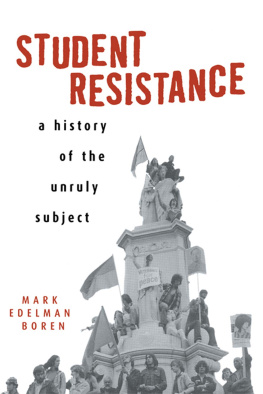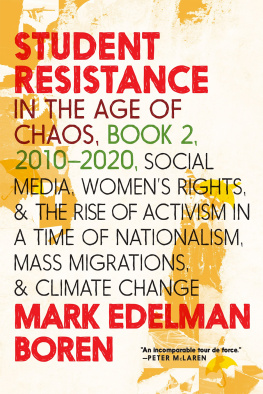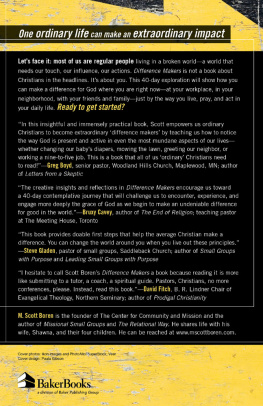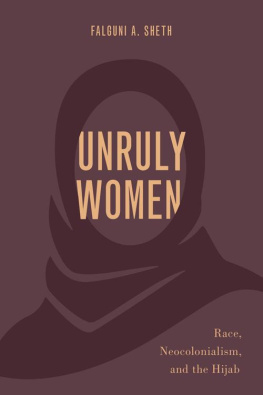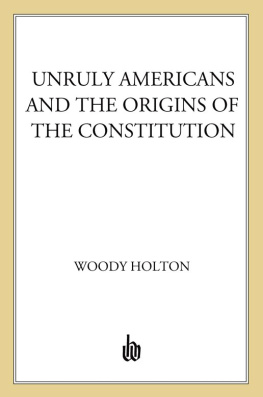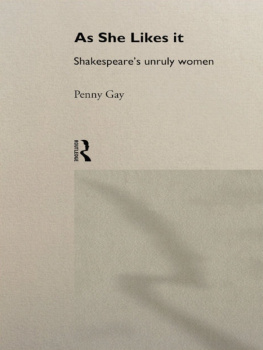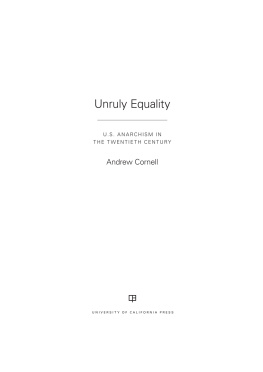Boren - Student resistance: a history of the unruly subject
Here you can read online Boren - Student resistance: a history of the unruly subject full text of the book (entire story) in english for free. Download pdf and epub, get meaning, cover and reviews about this ebook. year: 2002, publisher: Taylor and Francis; Routledge, genre: Politics. Description of the work, (preface) as well as reviews are available. Best literature library LitArk.com created for fans of good reading and offers a wide selection of genres:
Romance novel
Science fiction
Adventure
Detective
Science
History
Home and family
Prose
Art
Politics
Computer
Non-fiction
Religion
Business
Children
Humor
Choose a favorite category and find really read worthwhile books. Enjoy immersion in the world of imagination, feel the emotions of the characters or learn something new for yourself, make an fascinating discovery.
- Book:Student resistance: a history of the unruly subject
- Author:
- Publisher:Taylor and Francis; Routledge
- Genre:
- Year:2002
- Rating:3 / 5
- Favourites:Add to favourites
- Your mark:
- 60
- 1
- 2
- 3
- 4
- 5
Student resistance: a history of the unruly subject: summary, description and annotation
We offer to read an annotation, description, summary or preface (depends on what the author of the book "Student resistance: a history of the unruly subject" wrote himself). If you haven't found the necessary information about the book — write in the comments, we will try to find it.
Boren: author's other books
Who wrote Student resistance: a history of the unruly subject? Find out the surname, the name of the author of the book and a list of all author's works by series.
Student resistance: a history of the unruly subject — read online for free the complete book (whole text) full work
Below is the text of the book, divided by pages. System saving the place of the last page read, allows you to conveniently read the book "Student resistance: a history of the unruly subject" online for free, without having to search again every time where you left off. Put a bookmark, and you can go to the page where you finished reading at any time.
Font size:
Interval:
Bookmark:
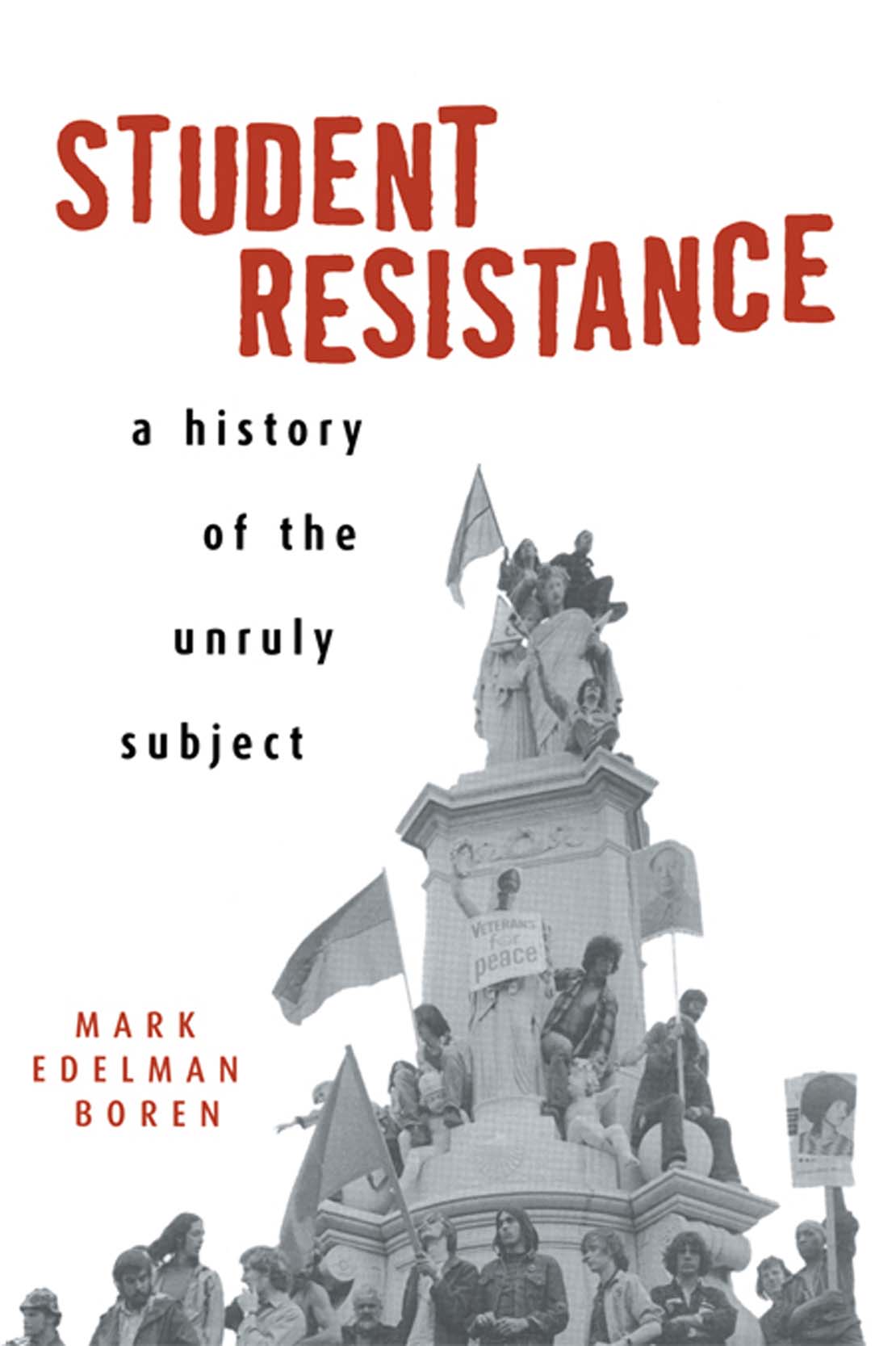
 Student Resistance
Student Resistancethe Unruly Subject
Routledge
New York London
For Kate
Published in 2001 by
Routledge
270 Madison Ave,
New York NY 10016
Published in Great Britain by
Routledge
2 Park Square, Milton Park,
Abingdon, Oxon, OX14 4RN
Routledge is an imprint of the Taylor & Francis Group.
Transferred to Digital Printing 2011
Copyright 2001 by Routledge
All rights reserved. No part of this book may be reprinted or reproduced or utilized in any form or by any electronic, mechanical, or other means, now known or hereafter invented, including photocopying and recording or in any information storage or retrieval system, without permission in writing from the publishers.
Library of Congress Cataloging-in-Publication Data
Boren, Mark Edelman.
Student resistance : a history of the unruly subject / Mark Edelman Boren
p. cm.
Includes bibliographical references and index.
ISBN 0-415-92623-8 (hbk.) ISBN 0-415-92624-6 (pbk.)
1. College studentsPolitical activityHistory. 2. Student
movementsHistory. I. Title.
LB3610.B665 2001
378.1'981dc21
00-056139
Publisher's Note
The publisher has gone to great lengths to ensure the quality of this reprint but points out that some imperfections in the original may be apparent.
The age of complacency is ending
C.Wright Mills
Several generations of American activistsboth past and present inspired my interest in student resistance. During the writing of this book, my own students taught me much on the subject, and I owe a great deal of my understanding of modern student concerns to them. My professional colleagues at the University of Georgia and at the University of North Carolina at Wilmington have shared their own insights and stories, for which I am deeply grateful. Librarians and staff at numerous institutions helped me locate materials, and particularly helpful were those at the University of Georgia, Harvard, the Huntington, and the University of North Carolina at Wilmington. During 1998 and 1999, the University of Georgia contributed to research trips to Paris, London, Washington, and Mexico City; in 1999 the same university also made possible an extensive trip traveling and researching in California. In all my travels, I met people with stories, artifacts, and opinions that helped me deepen my understanding of specific conflicts and their outcomes; the enthusiasm I encountered for the subject confirmed that the effects of acts of student resistance not only are important to the participants but are socially profound and globally felt. I was particularly lucky to be able to visit Mexico City during the recent UNAM strikes and witness, as well, the massive student demonstration commemorating the 1968 Mexico City student massacre; students, riot police, professors, government officials, Mexico City residentsall willingly shared their views on present and past student actions, giving me a unique opportunity to see Mexico's student conflicts from different vantage points.
My greatest thanks go to individuals, however, who gave me their time, thoughts, and friendship. I am grateful to Tricia Lootens, Miranda Pollard, and Uri Vaknin, who confirmed for me that certain battles were worth fighting; they've given much of their lives to making the world a better place in which to live, and my respect for them is great. France Teague is an inspiration. John Boyd, Tim Engels, Michael Hendrick, Elizabeth Kraft, Hubert McAlexander, Patrick McCord, Governor Raymond P. Shafer, Joe Sigalas, and Anne Williams have all contributed historical perspectives on student actions that expanded my understanding of student resistance in significant and very different ways. Bill Germano at Routledge offered advice on the manuscript and support. Special thanks to Debra Williams, Stewart Cauley, Enicia Fisher, and Ted Blake, all of whom provided me with knowledge, sanity, support, friendship, and lots of caffeine.
Doyle Boren can never know the gratitude I feel for his being my father. I owe much of who I am to his guidance. Jan Boren has taught me much about thoughtfulness and compassion. Bill and Nancy Montwieler have been tremendously supportive; Bill's knowledge of political history and Nancy's understanding of and involvement in the struggles of American labor have been invaluable, and their suggestions greatly improved the final book. My brother, Curt, has always been an inspiration and an example for me, and my sisters- and brother-in-lawAlice, Thea, and Jacobhave enthusiastically encouraged me on this project and have also had the good graces to at least feign interest when I rambled on too long about it. David's and Alicia's arrival in the world have made me understand what is at stake in making the world a more humane, thoughtful, and peaceful place.
My greatest debt I owe to two women who have had the most influence on my life. My mother, Nelda Edelman Boren, gave me love and taught me the meaning of personal strength. Her final battle, with cancer, was fought with the same ardor with which she lived her life. Katherine Montwieler's support and love are beyond measure. To my delight, my debt to her grows daily. As with all my endeavors, Kate had faith in this project from the start, and she also read, discussed, and corrected each draft of the manuscript. Thanks to her, the struggle of life is a joyous one.
The Fourth R
Like many people interested in student activism and resistance, I was first fascinated by the subject when I was a student; the idealism of youthful twenty-somethings who wanted to make the world a better place in some way, the war stories of older friends who had taken part or wished that they hadin demonstrations in the 1960s, and the cultural myths surrounding student actions: all intrigued me. Student resistance was exotic in an era when political activism on U.S. campuses had become, well, quixotic. In discussions with current student activists, I noticed that many could refer to student heroes, movements, and organizations (recalling that the Student Nonviolent Coordinating Committee [SNCC], for instance, worked for civil rights or that the Weathermen were terrorists), but such cultural knowledge tended to be vague, and often limited to 1960s efforts in the United States and France. And once I began exploring the subject in libraries, I discovered that I had to immerse myself, become a student activist scholar of sorts, before I could even begin to piece together a general history of student activism. Many books studied specific student movements, mostly those occurring in 1968 and 1969, in depth, but to learn about the subject generally, one had to work through numerous books, memoirs, analyses, and articles. It took me a long time to build a lexicon of student resistance; no current text offered a general global history.
Numerous studies, however, pointed out that student activism and student movements were so diverse and ubiquitous that one could only study them individually. Granted, the premise is soundif one is embarking on a scholarly career in academia; and yet the field itself is so vast, specialized, and separatist, and so rife with acronyms and jargon, that there is a real need for a general, comprehensive introduction to the subject. I thus present
Font size:
Interval:
Bookmark:
Similar books «Student resistance: a history of the unruly subject»
Look at similar books to Student resistance: a history of the unruly subject. We have selected literature similar in name and meaning in the hope of providing readers with more options to find new, interesting, not yet read works.
Discussion, reviews of the book Student resistance: a history of the unruly subject and just readers' own opinions. Leave your comments, write what you think about the work, its meaning or the main characters. Specify what exactly you liked and what you didn't like, and why you think so.

